Let F(x) = a u(x) (t) dt for the specified a, u, and . Use a
Question:
Let F(x) = ∫au(x) ƒ(t) dt for the specified a, u, and ƒ. Use a CAS to perform the following steps and answer the questions posed.
a. Find the domain of F.
b. Calculate F′(x) and determine its zeros. For what points in its domain is F increasing? Decreasing?
c. Calculate F″(x) and determine its zero. Identify the local extrema and the points of inflection of F.
d. Using the information from parts (a)–(c), draw a rough handsketch of y = F(x) over its domain. Then graph F(x) on your CAS to support your sketch.
a = 0, u(x) = 1 - x2, ƒ(x) = x2 - 2x - 3
Fantastic news! We've Found the answer you've been seeking!
Step by Step Answer:
Related Book For 

Thomas Calculus Early Transcendentals
ISBN: 9780321884077
13th Edition
Authors: Joel R Hass, Christopher E Heil, Maurice D Weir
Question Posted:





